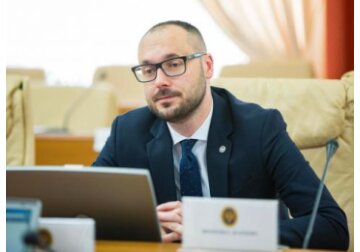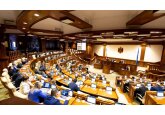
Moldova’s Ministry of Justice has elaborated a draft of the so-called "Magnitsky Moldova" act, which transpose international sanctions to the legislation of our country.
Minister of Justice Sergiu Litvinenco announced this at a joint press conference with Prime Minister Natalia Gavrilita, noting that the bill will be submitted for public discussions. According to him, "Magnitsky Moldova" bill is a complex, inspired by both the U.S. legislation and the states that have already transposed the "Magnitsky Act" into their legislation (Canada, Lithuania, and UK). Sergiu Litvinenco explained that the so-called "Magnitsky Moldova" act will clarify in detail which individuals and legal entities can be subject to sanctions transposed to Moldovan legislation. This refers to persons directly included in the sanctions lists, as well as to persons not included in the list of relevant sanctions, but having direct or indirect connections with the persons included in the sanctions lists. Another set of provisions of the "Magnitsky Moldova" act concerns the method of transposing international sanctions into national law. Everyone on the "Magnitsky List" or similar sanctions list will have all their assets frozen in Moldova. They will not be able to sell, donate or transfer them to other people. The day-to-day management will be carried out by state-appointed persons. The state will be able to take over the management of the assets of persons on the sanctions list or persons affiliated with them. It will be forbidden to make any goods available to the persons concerned, as well as to provide these persons with financial services: opening bank accounts, money transfers, and granting loans. Legal entities that would have affiliations with persons on the sanctions list could be subject to specific sanctions, making it difficult for them to operate. They will be able to apply to the competent authorities of Moldova, for the appointment of supervisory authorities, in order to carry out their normal activities, as well as in accordance with international restrictive measures. Persons subject to international sanctions, foreign citizens and stateless persons may be subject to bans on access to the territory of Moldova, which will serve as grounds for revoking visas or refusing to issue them in the future. There is also a possibility to revoke licenses and permits from companies owned by or affiliated with persons on the sanctions list. Under the bill, the Broadcasting Council would be able to revoke licenses from companies owned by or affiliated with sanctioned individuals. The Broadcasting Council would be obliged to revoke a license if a TV channel promotes the image of a person or affiliate on the sanctions list. // 09.12.2022 - InfoMarket







